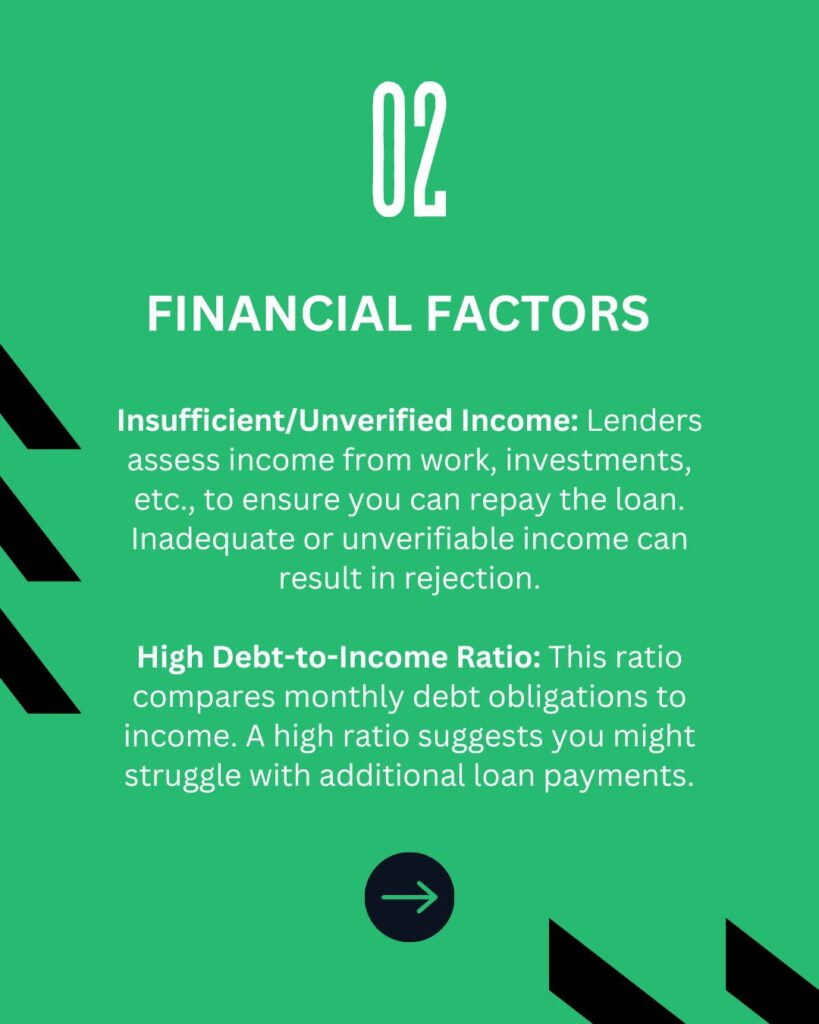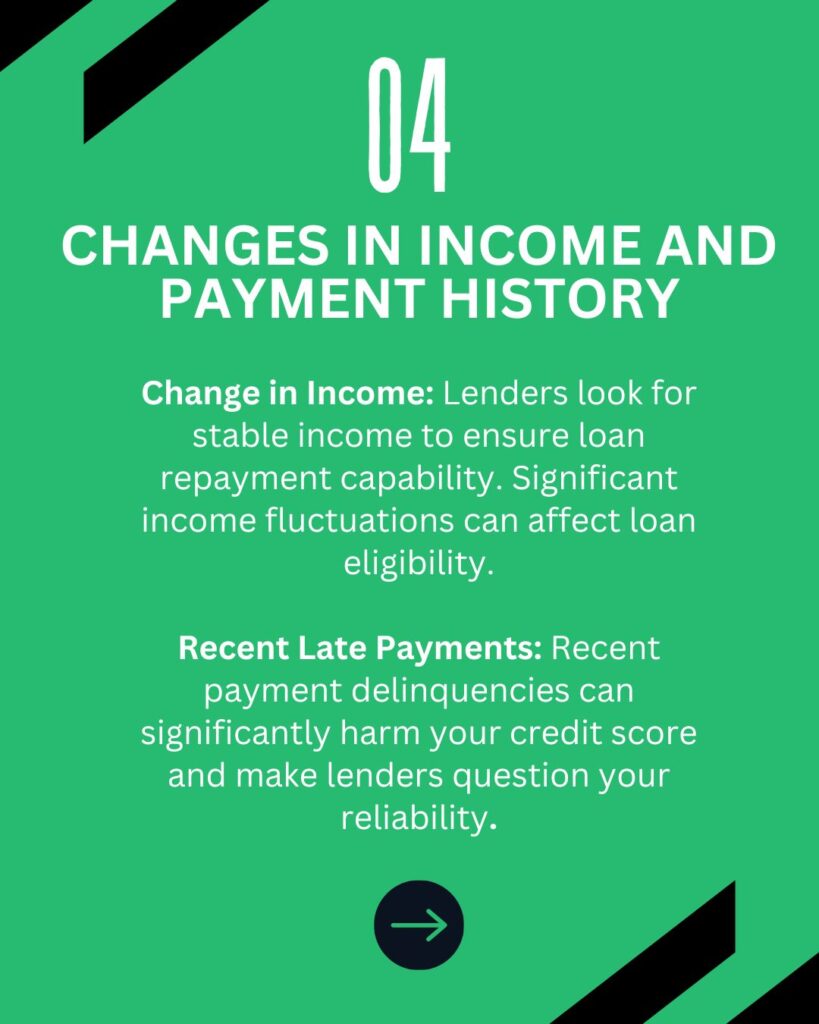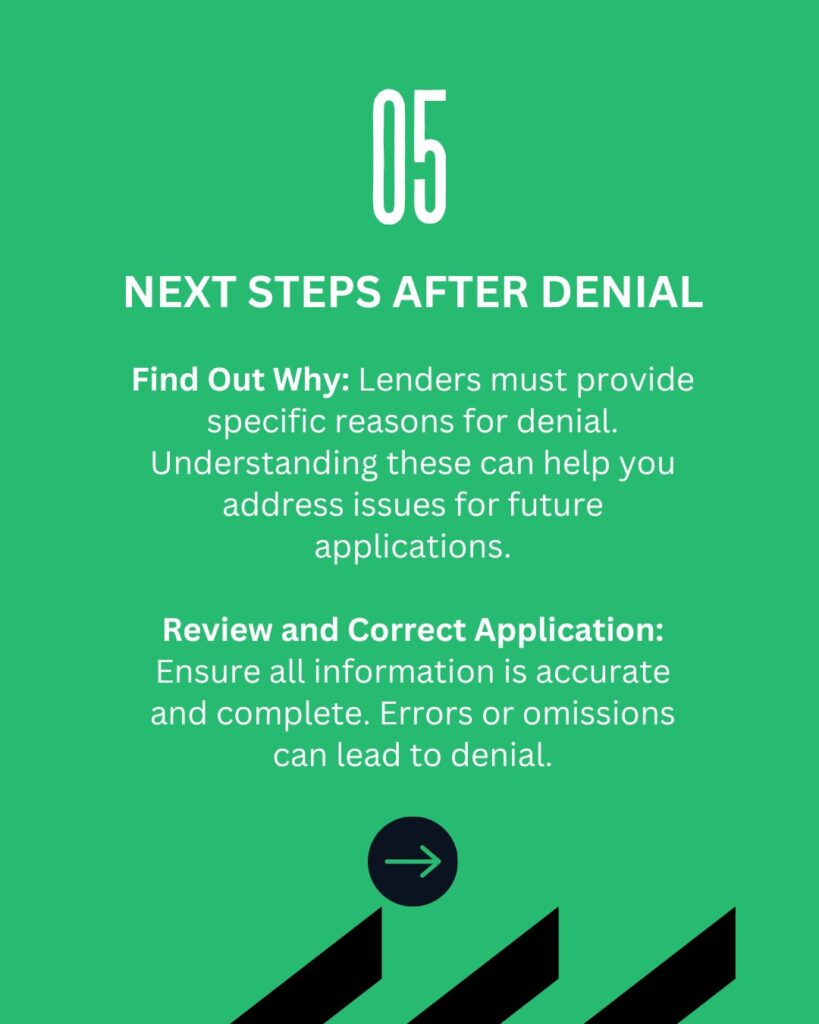How to make sure a business loan application is successful
Why was your business loan application denied?
If you have recently applied for a business loan and your application was declined, it may feel insulting or demeaning, but the first thing you need to understand is that it is nothing personal. There are several potential reasons for having a business loan denied.
It is important to note that there are many lenders out there with different lending conditions which means that if you get rejected for a certain reason by one lender, you may get accepted elsewhere because a different lender has different loaning options. There are various options that are available to you in order to improve your chances of getting approved the next time you apply.
There are many reasons as to why you may have had a business loan denied, the good part is that it is not at a lender’s discretion to explain why. Usually, you will receive what’s called an adverse action letter from the lender explaining the reasons why you were rejected for a business loan.
There are usually two main factors that lead to lenders denying business loan applications, these are predominantly problems with credit and problems with income.








Here are some of the reasons you might have had a business loan denied.
Poor credit history
Lenders primarily look at your borrowing history which is reflected through your credit scores. This is because lenders want to know if you are able to pay back the loan, seeing a solid history of borrowing and repaying will put the lenders at ease to know that their loan will be repaid back to them.
However, if you have not borrowed much in the past, your lack of credit history may lead to your loan being declined or if you have experienced complications with repaying loans in the past.
Brief credit history
The length of your credit history is important to show your creditworthiness to lenders. They need to be able to see that you have an established history with credit products. No history does not reflect a good history. No history means nothing to base the fact that you will be a responsible borrower.
If you keep up responsible habits such as consistently paying off your bills with a credit card or any other form of credit, in time your score will reach its full potential. This can help reduce the chances of having a business loan denied.
Bankruptcy
Bankruptcy will affect your credit rating therefore making it quite difficult for you to get a loan from many lenders. It is also against the law to borrow more than £500 from any lender without telling them that you are bankrupt until you are discharged from your bankruptcy.
Insufficient/unverified income
Lenders look at your work, investments, and other sources of income in order to assure them that you will be able to repay the loan. With some loans, lenders are required by law to calculate your ability to repay the loan through your income.
Even if you have a good credit history, if the numbers do not add up in the end, lenders may decline your loan for that reason. Either because you don’t earn enough to repay the loan or your income cannot be verified with the information you have provided.
Debt-to-income ratio
This ratio is the comparison of how much you owe each month to how much you earn. Most lenders use your own debt-to-income ratio in order to determine whether you will be able to handle the repayments after the approval of your loan. You may see your business loan denied if the numbers add up and it looks like your business will not be able to handle any new debts.
Collateral
With some loans, you are able to personally guarantee the loan with your lender by essentially pledging a personal asset as collateral that is valued at the same amount of the loan. If you have a poor or brief credit history as well as no collateral, the chances of getting approved for a loan are much lower.
Contact us to find out more
Too many credit inquiries
You may think that applying for several loans at once with different companies may increase your chances of getting approved, but think again. When you apply for more than one loan or credit within a short period of time, it negatively impacts your credit rating. There is no limit or rule to determine how much credit you can apply for or the number of applications you wish to make however, there are consequences to your credit rating if you are making multiple applications for credit.
Making multiple loan applications also makes it seem like you are desperate for money which does not sit right with a lot of lenders, the argument is that, if you look like you need the loan so badly, you may struggle to repay it. As this will also reflect badly on your credit rating, it will make it difficult for you to receive credit or loans in the future as with any loan that you apply for, the lender will complete a credit check.
Change in income
The figure on your pay check every month does not affect your credit score. But lenders look at your income to determine whether that income will be sufficient enough to repay the loan. Therefore, affecting your eligibility for certain new credit accounts.
Recent late payments
You may be very responsible when it comes to paying your monthly credit card bills and you may have done it for years, slowly building up your credit score, but you had an off month and out of nowhere you accidentally miss a few payments. Unfortunately this can affect you pretty badly. The higher the score, the harder it falls when something occurs to hurt your credit rating. This, in some cases, can hurt your loan application more than consumers who had poor credit to begin with.
Foreclosure
Usually, for conventional borrowers, there is a waiting period of typically seven years after a foreclosure for the borrower to be eligible for another loan. For mortgage loans, the waiting period is a minimum of three years until you will be able to apply for a mortgage, this is three years from the time that the foreclosure case has completely ended.
Other issues
In some instances, you can have a business loan denied for less obvious reasons. This could include mistakes such as submitting an incomplete application, or perhaps a problem with your business model.
Action Points
- Credit Challenges: Issues with poor credit history, brief credit history, or bankruptcy can lead to loan application denial. Lenders assess your borrowing and repayment history to gauge reliability.
- Income Verification Problems: Insufficient or unverifiable income may result in loan rejection. Lenders need to ensure your income is adequate for loan repayment.
- High Debt-to-Income Ratio: If your monthly debt obligations compared to your income are too high, lenders may doubt your ability to manage additional loan payments.
- Lack of Collateral: For loans requiring collateral, not having sufficient assets to secure the loan can lead to denial.
- Excessive Credit Inquiries: Applying for multiple loans in a short period can negatively impact your credit rating and make you appear desperate for credit, which is a red flag for lenders.
- Income Stability Concerns: Any recent changes in income or employment can affect loan eligibility, as lenders look for stable income for repayment assurance.
- Recent Payment Delinquencies: Late payments, especially recent ones, can significantly impact your credit score and loan application, regardless of a previously good credit standing.
- Foreclosure History: A recent foreclosure can impose a waiting period before you’re eligible for certain types of loans, affecting your loan application.
- Application Errors or Business Model Concerns: Incomplete applications or issues with your business plan can also be reasons for loan denial.
I’ve had a business loan denied – What do I do next?
Having a business loan denied can be disappointing and frustrating but the good news is there are some steps that you can take to get your application reconsidered.
Find out why you were rejected
You need to find out why you were rejected in the first place and also have a lawful right to know. Most lenders will be more than happy to explain why you were rejected and what is required from you to be reconsidered. You have the right to ask the reason behind the rejection within 30-60 days and the lender will be required to inform you the reasons. It is important to note that failure to meet “minimum standards” is not an accepted reason, it has to be a more specific, concrete reason.
It may be a bit soul-crushing reading through a list of why you did not meet a lender’s requirements, but more often than not, it is all about the numbers. The rejection is not personal. You can view the specifics and amend them or change aspects of your lifestyle or business to ensure that next time you will get approved.
Look for errors in your application
You need to thoroughly check through your application, double-check that you have not forgotten to report any source of income or accidentally embellished an additional zero to any numbers.
Review your own credit score
It does not harm your credit score for you to check your own credit. It is a good idea to check in periodically on your credit score to see what is affecting it in a positive or negative way. You are entitled by law to get a free credit report, that way you can see what the banks can see.
Request reconsideration
If you have noticed an error in your application that can be corrected or suspect that you just barely missed the mark to qualify for the loan, it is worth calling the lender to discuss your case. This conversation should be a formal discussion, not you begging to be approved for the loan. How you act affects your image with lenders, go through all the points clearly that you have to get your loan reconsidered and accept whatever their response may be.
In conclusion, these steps might help you convince a lender to reverse their decision as well as improve your application. Unfortunately there is no guarantee however, there are other options out there for you.
If you have had your business loan denied or you have concerns over your application, contact us today, Our team can help make sure your loan application has the greatest chance of success. We can also advise you on the best alternative funding options for your business if you cannot secure a bank loan.
Action Plan
- Identify Rejection Reason: Request the specific reason for your loan denial from the lender, as understanding this can guide improvements.
- Review and Correct Application: Double-check your application for accuracy and completeness.
- Assess Your Credit: Check your credit report for errors or areas of improvement.
- Seek Reconsideration: If an error is found or circumstances have changed, formally request a loan reconsideration with the lender.
- Consider Alternatives: If still unsuccessful, explore other funding options suitable for your business needs.
Check out our other articles, webinars and podcasts in the Samera Learning Centre.
Unsuccessful Loan Application FAQs
What are the most common reasons for business loan denial?
Business loans are commonly denied due to several factors, including:
- Poor credit history: A low credit score signals financial risk.
- Insufficient collateral: Lack of assets to back the loan.
- Weak cash flow: Inability to demonstrate consistent revenue to repay the loan.
- Incomplete documentation: Missing or incorrect financial records.
- New business status: Startups often face rejection without a proven track record.
Strengthening these areas can improve approval chances.
How does poor credit history affect loan approval?
Poor credit history negatively impacts loan approval as it signals financial instability to lenders. A low credit score indicates a higher risk of default, making lenders hesitant to approve loans or offering them at higher interest rates. Lenders prioritize applicants with strong credit histories, as it reflects responsible debt management and timely payments. Improving your credit score before applying for a loan can significantly boost your chances of approval and help secure better loan terms.
Can weak cash flow lead to loan rejection?
Yes, weak cash flow can lead to loan rejection. Lenders rely on cash flow to assess your ability to repay the loan. If your business cannot demonstrate consistent, strong cash flow, it signals higher financial risk, making lenders reluctant to approve the loan. Improving cash flow by managing expenses and increasing revenue is key to strengthening your application and improving your chances of loan approval.
What role does insufficient collateral play in loan denial?
Insufficient collateral can lead to loan denial because lenders use collateral as security in case the borrower defaults on the loan. Without adequate assets to back the loan, lenders perceive a higher risk, making them less likely to approve the application. Collateral reassures lenders that they can recover their funds, even if the business struggles to meet its repayment obligations. Increasing your collateral or opting for unsecured loans may help in such cases.
How does an incomplete business plan impact loan approval?
An incomplete business plan can significantly impact loan approval because lenders rely on it to assess your business’s viability and potential for growth. A strong business plan outlines your goals, financial projections, and how you plan to use the loan. Without detailed information, lenders may see your business as risky, which can lead to loan denial. Ensuring your plan is thorough and clear can improve your chances of securing funding.
Do new businesses face higher loan rejection rates?
Yes, new businesses often face higher loan rejection rates due to limited financial history and lack of proven revenue. Lenders typically prefer businesses with a track record of profitability and established cash flow, which reduces the perceived risk. New businesses may also struggle with lower credit scores or insufficient collateral, making it harder to meet lending requirements. Strengthening a business plan and improving financial documentation can help improve approval chances.
Why is thorough documentation important for loan approval?
Thorough documentation is crucial for loan approval because it provides lenders with a clear picture of your business’s financial health, stability, and ability to repay the loan. Key documents like financial statements, tax returns, and a detailed business plan help demonstrate transparency and reduce perceived risk for the lender. Missing or incomplete documentation can raise concerns and lead to loan rejection, so it’s important to provide accurate, comprehensive records.
How can I improve my credit score to get a business loan?
To improve your credit score for a business loan, focus on paying off outstanding debts, making payments on time, and keeping your credit utilization low. Regularly review your credit report for errors and correct any inaccuracies. Reducing personal and business debts can also boost your creditworthiness. Building a solid credit history over time will strengthen your financial profile, increasing your chances of loan approval.
What is the impact of outstanding debt on loan approval?
Outstanding debt can negatively impact loan approval because it increases your debt-to-income ratio, signaling to lenders that your business may have difficulty managing additional financial obligations. High levels of debt suggest a higher risk of default, making lenders less likely to approve your application. Paying down existing debts and maintaining a healthy credit utilization ratio can improve your chances of securing a loan.
Can inconsistent financial records result in loan denial?
Yes, inconsistent financial records can lead to loan denial because they raise red flags for lenders, making it difficult to assess the financial stability and reliability of your business. Inaccurate or incomplete financial statements, tax returns, or cash flow reports suggest poor financial management, which increases the risk for lenders. To avoid this, ensure your financial records are accurate, up-to-date, and well-organized before applying for a loan.
How can I strengthen my business’s cash flow for loan approval?
To strengthen your business’s cash flow for loan approval, focus on improving revenue by increasing sales or finding new income streams. Manage expenses effectively by cutting unnecessary costs and renegotiating vendor contracts. Implement efficient invoicing practices to ensure timely payments from clients and maintain adequate cash reserves. Additionally, use financial software to track and optimize cash flow, ensuring stability and reliability in your financial reports, which can reassure lenders of your ability to repay loans.
Does a lack of industry experience affect loan decisions?
Yes, a lack of industry experience can affect loan decisions. Lenders view industry experience as a sign that you understand the market and can effectively manage the business, which reduces the risk of default. Inexperienced business owners may struggle to prove their ability to handle industry challenges, making it harder to secure loans. To improve your chances, you can strengthen your application with a solid business plan, a strong management team, or mentorship from industry experts.
What are the key financial documents required for a business loan?
The key financial documents required for a business loan typically include:
- Profit and Loss Statements: To show income and expenses.
- Balance Sheets: To demonstrate assets, liabilities, and net worth.
- Cash Flow Statements: To highlight your business’s liquidity and ability to repay the loan.
- Tax Returns: Business and sometimes personal returns for 2-3 years.
- Financial Projections: To show future revenue and growth potential.
- Bank Statements: To verify cash flow and account history.
How does a lender assess business risk during the application?
Lenders assess business risk during the loan application process by reviewing key factors like:
- Financial Stability: Examining cash flow, profit margins, and debt levels.
- Credit History: Checking both personal and business credit scores.
- Industry Experience: Evaluating your knowledge and track record in the field.
- Collateral: Determining available assets to secure the loan.
- Business Plan: Assessing future growth potential and strategy.
These factors help lenders gauge the likelihood of loan repayment.
How can I reapply after being denied a business loan?
To reapply after being denied a business loan, first address the issues that led to the denial, such as improving your credit score, strengthening cash flow, or providing more collateral. Review your financial statements, ensure your business plan is detailed and comprehensive, and gather all required documentation. It’s also beneficial to work with a financial advisor or lender to identify areas for improvement before reapplying.
Can applying for too many loans hurt my approval chances?
Yes, applying for too many loans within a short period can hurt your approval chances. Each loan application triggers a hard inquiry on your credit report, which can lower your credit score. Multiple inquiries also signal to lenders that you may be in financial distress, increasing your perceived risk. To improve your chances, space out applications and focus on strengthening your financial profile before reapplying.
Does personal credit score affect business loan decisions?
Yes, personal credit scores do affect business loan decisions, especially for small businesses or startups. Lenders often evaluate the owner’s personal credit history to assess financial responsibility and gauge the likelihood of loan repayment. A low personal credit score can signal higher risk, leading to potential loan rejection or higher interest rates. To improve your chances, work on building both personal and business credit.
How can I address lender concerns in my reapplication?
To address lender concerns in your reapplication, start by reviewing the reasons for the initial denial and resolving any issues, such as improving your credit score or increasing cash flow. Ensure that your financial documents are accurate and updated. Strengthen your business plan by adding detailed projections and outlining clear strategies for growth. You may also offer additional collateral or a larger down payment to reduce risk for the lender. Working with a financial advisor can further refine your application.
Why is having a strong business plan crucial for loan approval?
A strong business plan is crucial for loan approval because it provides lenders with a clear understanding of your business’s goals, financial projections, and strategies for success. It demonstrates your ability to repay the loan by outlining your revenue streams, growth potential, and risk management plans. A well-prepared plan reduces the perceived risk for lenders, improving your chances of securing the loan with favorable terms.
What are the best ways to prepare before applying for a business loan?
To prepare before applying for a business loan, follow these steps:
- Review Credit Scores: Ensure both personal and business credit scores are strong.
- Organize Financial Documents: Gather profit and loss statements, tax returns, and cash flow records.
- Create a Solid Business Plan: Include financial projections, goals, and strategies.
- Improve Cash Flow: Demonstrate consistent revenue and financial stability.
- Address Existing Debts: Reduce outstanding liabilities where possible.
Learn more: Related Articles
About the Author

Arun Mehra
With almost twenty years of commercial experience and knowledge in Dentistry, Arun’s expertise is valued by hundreds of businesses across the UK. His financial acumen and know-how, along with his hands-on commercial expertise have helped clients, large and small, new and established to achieve great things.
Arun is the founder of the Samera Group, starting the business with just one client sitting at his father’s dining table. Fifteen years on, Team Samera now service hundreds of Dental clients, run exciting events, help clients raise finance, and are very active in helping clients buy or sell Dental practices.
Business Loans for Dentists
We’ve been helping to fund the future of the UK’s dentists for 20 years and our team are made up of former bankers with decades of experience and contacts in the UK’s healthcare lending sector.
You can find out more about working with Samera Finance and the financial services we offer by booking a free consultation with one of the Samera team at a time that suits you (including evenings) or by reading more about our financial services at the links below.
Contact Information
Fill in the form and our team will get back to you as soon as possible.
or
or
Dental Practice Finance: Further Information
For more information on raising finance for your dental practice, including more articles, videos and webinars check out our Learning Centre here, full of articles an webinars like our How to Guide on Financing a Dental Practice.
Make sure you never miss any of our articles, webinars, videos or events by following us on Facebook, LinkedIn, YouTube and Instagram.



